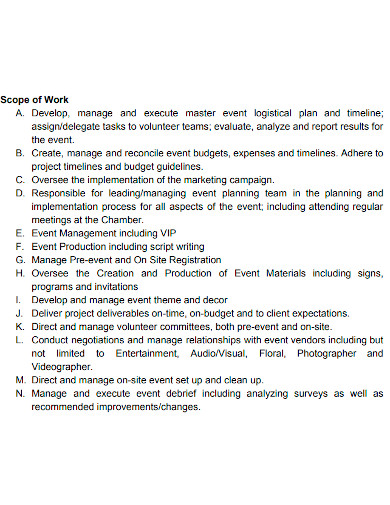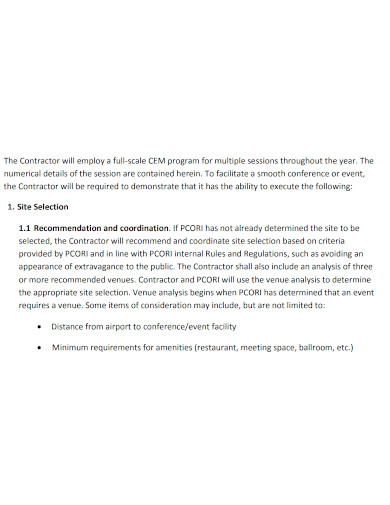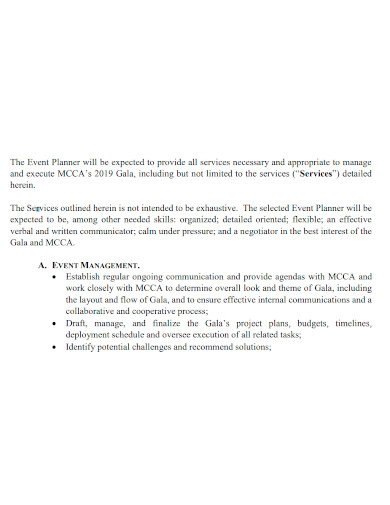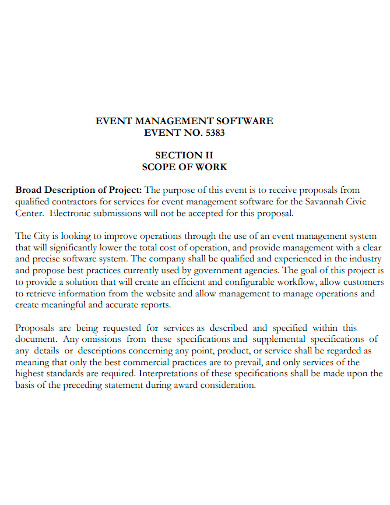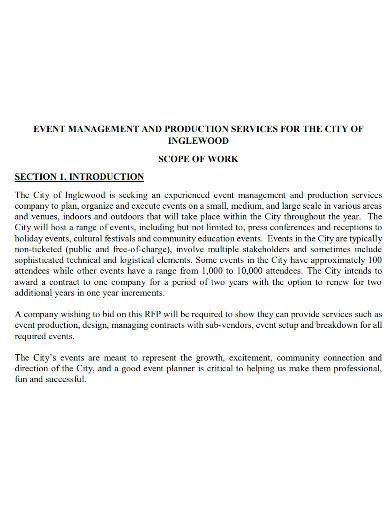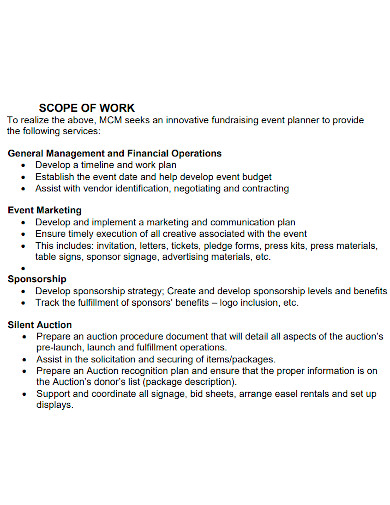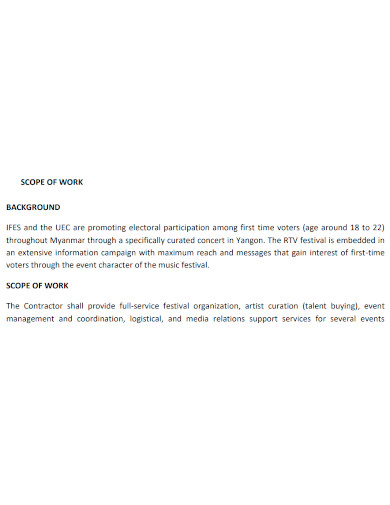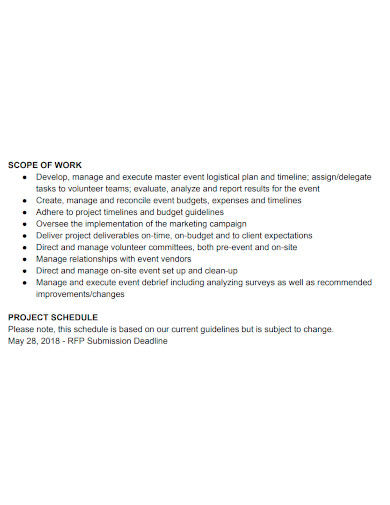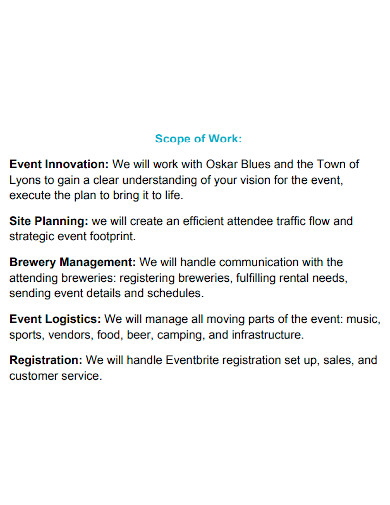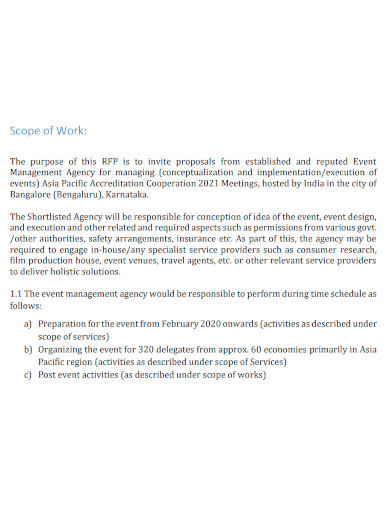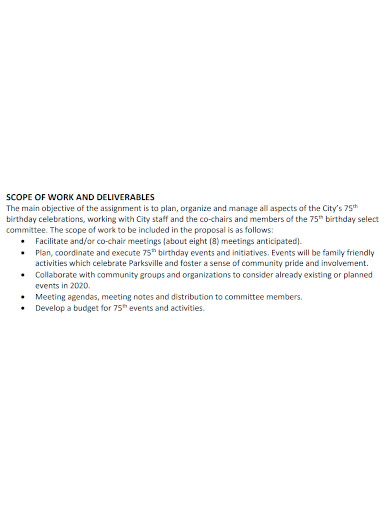Events are fun and exciting to attend to but it’s different if you are organizing them. Event management can be both exhilarating and stressful at the same time. If you’re interested to become an event manager, do you have what it takes to be one? Read the article to find out the scope of work of event management.
10+ Event Management Scope of Work Samples
1. Event Management Scope of Work Sample
2. Project Event Management Scope of Work
3. Event Management Scope of Work Format
4. Event Management Software Scope of Work
5. Event Management Services Scope of Work
6. Editable Event Management Scope of Work
7. Standard Event Management Scope of Work
8. Professional Event Management Scope of Work
9. Formal Event Management Scope of Work
10. Event Management Agency Scope of Work
11. Event Management Services Scope of Work Sample
What is an Event Manager?
Also known as event planners or event coordinators, Event managers, or alternatively known as event planners and event coordinators, are the people assigned to find and book venues, partner with clients, organize logistics, manage budgets, and prepare for different types of events.
The Event Management Services Scope of Work
1. Determine the Feasibility of the Event
The first step in managing events, no matter what theme or occasion it is whether if it’s a company event, social event, or awarding ceremony, is to know what are the objectives and goals of the events to help you determine the feasibility of the event. This step is what will kickstart your event. Discuss this with your clients and your team of organizers on what theme and type of event it should be.
Once you figured the things that were being mentioned, you can then determine the budget needed for the event. The budget is still an estimation at this stage since you’ll have to do a lot of changes in the planning later on. However, knowing the budget needed early is essential to help you keep track of how the expenses of the event should be managed.
2. Plan Out the Event
The next stage is where the event manager will then plan on how to meet the objectives and goals that were discussed earlier. At this stage, event managers will need to figure out the activities that will occur in the event, type of performances, the performers or speakers, the venue and date of the event, the sound and lighting aspects for the event, the layout of the venue, the style of the setting, branding, and timeline starting for the preparation until the actual date of the event.
3. Finalize All Details of the Event
Once the event manager and their team have hashed out the main vision and details for the event, it’s time to focus on other details that will complete the planning of the event. This stage is the most stressful stage for event managers since they will have their hands full on getting everything ready for the event. Depending on the type of event, most responsibilities event managers deal with are the following:
- Sending proposals to venues, caterers, and vendors, hiring performers or speakers, and finalizing contracts after an agreement was made between these parties
- Sending guest invites and tracking RSVPs
- Marketing events
- Discussing event schedule with vendors, venue managers, performers, speakers, etc.
- Creating check-in process and signage
- Training volunteers and other staff
- Updating clients by walkthroughs
4. Executing the Event
The day of the event has come and this stage is the most nerve-wracking for event managers. All the planning and preparing the events staff has done will finally be executed. However, during the event, there are still some responsibilities needed to be done. Setting up the venue, final walkthroughs, soundcheck, technology checks, guest check-ins, food and beverage services, last-minute issues/emergencies resolution are just some of the things that event managers face before the event will start. Giving out swag bags.
5. Feedback Gathering and Assessment
Even when the event is in full swing, the duties of the event manager are not yet done, in fact, it’s far from over. They have to attend to the guests and staff for feedback and observation and solve issues that may arise. And when the event is done, event managers have to send post-survey events to guests and staff to get their overall feedback on how the event was organized.
Event managers have to discuss with clients the outcome and the feedback from the survey. They will discuss the success of the event, the areas that might go slightly wrong, and the areas that need to be improved. Through this feedback, the event manager must develop an action plan to address these problems to avoid them at the next event they will organize.
FAQs
What are the qualifications needed for an event manager?
An event manager must have the following skills to be efficient in his or her job: Great communication, budgeting. project management, and organizational skills, creativity and have a keen eye for details, and has a high motivation to do every event project.
Is event management a good career option?
Being an event manager takes a lot of work to organize events. It is a great career choice for someone who loves to do events and great at organization. Another great thing about being an event manager is that you don’t need specific educational attainment or a specific field of study to do it; also it offers a lot of flexibility in working hours and gives you more independence in your work.
Can event planning be a side job?
Yes, event planning can be a side job if you have the time and energy to do it. You can manage events on your off-hours and on weekends. Just make sure to schedule your time well so none of your jobs will overlap each other.
It’s no secret that event management is no easy feat. This will test your patience and organization skills in many ways possible. However, the job is truly rewarding once you see the event that you’ve been preparing for is successful. If you’re dead set on becoming an event manager, familiarizing the scope of work is important. To help you get started, refer to our sample templates above. They are free so you can download as many as you like!
Related Posts
FREE 13+ Statement of Work Templates
FREE 10+ Event Program Schedule Samples
FREE 10+ Charity Risk Assessment Samples
FREE 9+ Communications Director Job Description Samples
FREE 8+ Maintenance Director Job Description Samples
FREE 8+ Sample Project Coordinator Job Description Templates
FREE 8+ Sample Public Relations Job Descriptions
FREE 8+ Aerospace Engineer Job Description Samples
FREE 14+ Event Planning Checklist Ideas Samples
FREE 12+ Scope Statement Templates
FREE 11+ Trade Marketing Job Description Samples
FREE 9+ Manufacturing Engineer Job Description Samples
FREE 9+ Sample Manager Job Description Templates
FREE 9+ Development Director Job Description Samples
FREE 8+ Paramedic Job Description Samples

